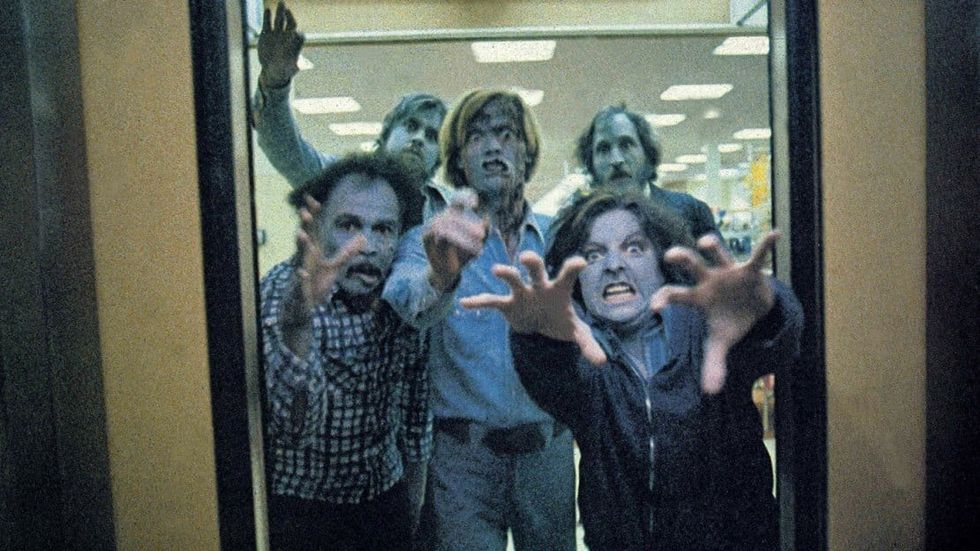In George A. Romero's 1978 zombie film Dawn of the Dead, the heroes take shelter at the mall. After arriving, Francine (Gaylen Ross) asks what the zombies are doing there.
Stephen (David Emge) coolly states, “[It’s] some kind of instinct... a memory. What they used to do. This was an important place in their lives.”
This zombie apocalypse masterpiece is Romero's social commentary on American consumer culture. As the zombies shuffle aimlessly through the mall, audiences can see that the zombies find comfort in devouring consumerism. But Romero’s commentary doesn’t end there.
If you're thinking, “I’m not like that. I would never become a zombie of consumerism,” well... maybe that wasn't even the message Romero was trying to send. Granted, you probably don't see yourself reflected in the decaying face of the undead; you probably related to the survivors seeking shelter. And that's exactly the director's point.
Sure, the zombies are “after the place” for the nostalgia of ritualistic shopping, but why do the heroes find comfort in the mall? Is the mall full of supplies? Does it act as a haven from the horrors of life beyond the mall’s doors? Yes (duh), but the heroes we identify with are captivated by consumerism, just like the zombies.
Eyebrow Cinema breaks this idea down in their video below:
Romero extends his critique to the human survivors that begins when they see the mall.
They, like the zombies, are drawn to the idea of having the whole place to themselves. They turn on the power to everything even though there is no need to turn on the fountain and open up the window displays. To put it simply, they are recreating a feeling of “normal life” during a time of crisis.
They raid a J. C. Penney’s for “essential items” like a portable television and a toaster oven, exclaiming that “[they] gotta get all [they] can.”
When faced with an actual threat, the survivors try to minimize the situation by listing all of the great things they can get from stores. Because the best way to avoid the fear of being eaten alive is to fill that void with stuff, right?
It’s hard to not lose yourself as well in the film. As the heroes try on clothes, play arcade games, and munch on about $45 ($175.50 today) worth of candy, the audience experiences secondhand thrills as the survivors live the fantasy of being locked in a mall overnight—except with zombies.
Even with zombies, the survivors and audience are lost in the false dream of having everything they have always wanted. Money is still valued, even though the economy no longer exists. When the looters show up, they also begin taking stacks of money, which fills Stephen with rage.
I can’t help but think, “What’s the point when you can just take anything?”
That statement alone shows that the lure of consumerism in the film got me as well. Romero’s commentary on consumerism has followed itself into a range of different zombie movies. In Zombieland, the characters raid Bill Murray’s house because all of the luxury and material items in the house will keep them safe from the outside world.

Some of the survivors in Dawn of the Dead do have redeeming moments where they can break away from the spell. A looter realizes he has no use for a TV and smashes all of the other TVs. Peter (Ken Foree) takes back his statement on staying behind to die with the mall, and Francine has an ah-ha moment as she realizes they are living as if there is no apocalypse happening.
These three moments are when the survivors and audience come face to face with their consumer guilt, the feeling of self-failure for indulging in the “wrong” action.
It’s hard to watch as Stephen and Roger (Scott Reiniger) lose themselves in their material possessions. I am shouting at my screen, “Don’t go back you dummy! You’ll die!” as Roger goes back for a bag of stuff and Stephen risks his life to protect what is his.
These characters stand with the idea of, "We took it. It's ours," which inevitably leads to their doom. Every human that died in the mall died for their right to consume.

So why does this all seem eerily familiar?
During the COVID-19 pandemic, many people protested to open up shopping malls and hair salons again so they could go back to “normal life." Understandably, some people wanted these places to reopen to provide work and to rebuild the economy, but some people just wanted to go back to doing leisurely activities.
Ignoring the pandemic to return to a life of leisure is what Dawn of the Dead tackled already. The heroes fill their time with leisure and material goods, yet they feel dissatisfied because they know that there is a real threat clawing at the door.
Becoming comfortable with your situation doesn’t mean that there isn’t a bigger one probably surrounding you. Romero reminds the audience that a consumerist society makes it too easy to ignore the horror, violence, and death that is affecting the world once you’ve become comfortable with what you have.
See, the threat in Dawn of the Dead isn't only the zombies, it's what consumerism has done to them... and every survivor is infected with it.
What are your thoughts on mindless consumption in a world full of horror? Let us know below!
Dig this spooky post? Then check out the rest of our Horror Week coverage for more tips, tricks, and terrifying takes.
Source: Eyebrow Cinema

 Richard Gere and Uma Thurman in 'Oh, Canada' via Kino Lorber
Richard Gere and Uma Thurman in 'Oh, Canada' via Kino Lorber  Uma Thurman in 'Oh, Canada'via Kino Lorber
Uma Thurman in 'Oh, Canada'via Kino Lorber 










The Real Zombie in George Romero's 'Dawn of the Dead' Is...You
Let’s be honest, we—humans and zombies alike—would all run to a mall as soon as the apocalypse started. But why?